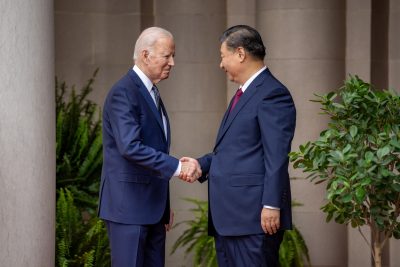President Xi and President Biden Exchanged Views on Tele-con

All Global Research articles can be read in 51 languages by activating the Translate Website button below the author’s name (only available in desktop version).
To receive Global Research’s Daily Newsletter (selected articles), click here.
Click the share button above to email/forward this article to your friends and colleagues. Follow us on Instagram and Twitter and subscribe to our Telegram Channel. Feel free to repost and share widely Global Research articles.
Global Research Referral Drive: Our Readers Are Our Lifeline
***
Chinese President Xi Jinping and U.S. President Joe Biden engaged in a significant phone conversation on 02 April 2024 (Tuesday) at President Biden’s request, delving into various aspects of China-U.S. relations and mutual concerns.
President Xi highlighted the forward-looking vision established during his meeting with President Biden in San Francisco last November, emphasizing the subsequent earnest actions taken by both sides to materialize their understandings. While acknowledging the initial stabilization of China-U.S. relations, President Xi also noted the emergence of negative elements, warranting careful attention from both nations.
Emphasizing the paramount importance of strategic perception in bilateral relations, President Xi likened it to the first button on a shirt that must be properly secured. He stressed against severing ties or resorting to conflict, urging mutual respect, peaceful coexistence, and mutually beneficial cooperation to maintain stable, constructive relations.
President Xi outlined three fundamental principles for guiding China-U.S. relations in 2024: valuing peace, prioritizing stability, and upholding credibility. He underscored the significance of respecting commitments, managing differences prudently, and enhancing cooperation while addressing global challenges responsibly.
Regarding sensitive issues such as Taiwan, President Xi reiterated China’s stance, highlighting the red line of “Taiwan independence” and urging concrete actions from the U.S. to align with President Biden’s commitment. He cautioned against actions that hinder China’s development or provoke conflict.
President Biden acknowledged the critical nature of the China-U.S. relationship, commending progress since the San Francisco meeting and emphasizing cooperation alongside managing differences responsibly. He reiterated the U.S.’s commitment to peaceful resolution of disputes, non-interference in China’s internal affairs, and adherence to the one-China policy.
President Biden raised concerns about various issues, including Taiwan, the South China Sea, and trade practices. He emphasized the importance of fair trade and preventing technology misuse while maintaining open channels of communication and diplomatic engagement.
Both leaders agreed on the importance of continued dialogue and cooperation across various domains, including diplomacy, economy, and climate response. They tasked their respective teams to advance the San Francisco vision, enhance bilateral exchanges, and address regional and global challenges collaboratively.
The conversation between President Xi and President Biden reflected a commitment to constructive engagement, highlighting the significance of managing differences while pursuing mutual interests for the stability and prosperity of both nations and the broader international community.
The relationship between China and the US holds immense significance on the global stage, and it’s imperative to diffuse tensions and bridge differences to foster harmony and understanding, thus promoting global stability and peace. Communication and dialogue play pivotal roles in achieving these goals, and recent interactions between the two nations are welcomed as positive steps in the right direction.
However, considering the political landscape in the US, one may speculate that these communications were politically motivated, particularly as President Biden faces considerable pressure amid declining popularity leading up to the upcoming Presidential Elections. Criticism of his nearly four-year tenure, particularly regarding policies on issues such as Israel, Ukraine, Taiwan, the South China Sea, North Korea, and Iran, has led to a sharp decline in his popularity.
It appears that President Biden’s conversation with President Xi may hold political significance for him, potentially aimed at demonstrating a strong stance on China and perhaps even competing with his predecessor, President Trump. Moreover, with only a few months left in office, the feasibility of implementing any commitments made during these communications may be limited, as voters will ultimately assess his performance over the entirety of his term, rather than focusing solely on recent dialogue.
In contrast, President Xi approached the conversation with seriousness, seizing the opportunity to express his firm stance on issues such as Taiwan and the ongoing technological competition and sanctions. As both the Secretary-General of the CPC and the Chairman of the Central Military Commission of China, President Xi commands significant authority and is known for his resolute statements, reflecting a genuine commitment to his positions.
Ultimately, it is in the best interest of both the US and China to normalize relations and redirect their energies towards global development, economic prosperity, and maintaining global peace and security. By working together harmoniously, they can contribute to creating a better world for current and future generations.
*
Note to readers: Please click the share button above. Follow us on Instagram and Twitter and subscribe to our Telegram Channel. Feel free to repost and share widely Global Research articles.
Prof. Engr. Zamir Ahmed Awan, Founding Chair GSRRA, Sinologist, Diplomat, Editor, Analyst, Consultant, Advisor, and Non-Resident Fellow of CCG. (E-mail: [email protected]).
Featured image: President Joe Biden greets President of the People’s Republic of China Xi Jinping, Wednesday, November 15, 2023, at the Filoli Estate in Woodside, California.(Official White House Photo by Carlos Fyfe)

